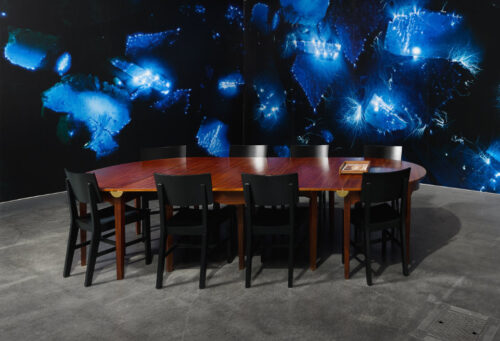Group Exhibition
15.02–28.04.2024: Kunsthalle Mulhouse, Mulhouse, FR
Malfunctions impact large collective service infrastructures everywhere, whether the result of the physical deterioration of worn and aging structures, government funding cuts, or energy and climate crises. Despite these material changes, there is a persistent social ideal and myth of large infrastructure as a cornerstone of public service, combining economies of scale, technical performance and quality service for the greater number.
In a time of environmental collapse, how should we consider our relationship with the technology and infrastructures that produce and manage communal services such water and sewage, electricity and gas? How can we free technology from its sole association with a history of modernity and progress? How can we deconstruct and collectively act upon the organization of these essential services that impact our environment and our relationship with the world?
The first part of this exhibition examines the forms and the stakes of infrastructure along with its potential for inspiration. Like thoughts, a selection of archival images plunges us into a moment of the technical odyssey where any type of infrastructure was potentially conceivable. Since the end of the 19th century, projects with complex technical, economic, and symbolic configurations have promoted renewable energies and decentralizing ecological perspectives to challenge the large, industrial network model that was the dominant means of production for many services.
The second part of the exhibition presents the resistance movements that developed during the 1970s. Faced with the impositions of the electrical order, another story unfolded. Resistance groups organized, collectives joined forces, and more spontaneous and radical occupation movements emerged. The 1974 Marckolsheim protest to prevent the construction of a chemical factory and the stances of figures like Françoise d’Eaubonne and Solange Fernex all testify to the rich history of social action in the Rhine Basin.
The final part of the exhibition addresses the topic of transition, which seems to focus primarily on which type of energy to use while the network itself with its transport and distribution infrastructure is almost never questioned. Alternatives exist and have always existed. There is a history of decentralizing thought processes of which Eastern France is particularly representative. In the face of centralization, municipal efforts for communal distribution in Schnönau, Ungersheim, Guebwiller, Ehnwihr, Muttersholtz, and Metz offer pathways towards future energy transitions.
Reintroducing these narratives into technical history not only enhances their legitimacy and desirability, but also opens the door to the imaginaries of a new tomorrow.
With: Carla Adra, Jeanne-Marie et Georges Alexandroff, Jessica Arseneau, Richard Buckminster Fuller, Marjolijn Dijkman, John Adolphus Etzler, Hilary Galbreaith, Hermann Honeff, Le Corbusier, Maya Mihindou, Jürgen Nefzger, Claude Parent, Christian de Portzamparc, Richard Rogers, Liv Schulman, Suzanne Treister, Félix Trombe, Tomi Ungerer, Henri Vicariot, Frank Lloyd Wright.
Curators: Géraldine Gourbe, Fanny Lopez, Sandrine Wymann.
